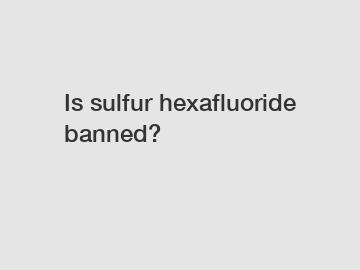Is sulfur hexafluoride banned?
Welcome, dear readers, to our insightful blog post. Today, we are going to unravel the mystery surrounding sulfur hexafluoride (SF6) and address the question on everyone's mind: Is SF6 banned? As we delve into the topic, we'll consider its uses, environmental impact, and the current regulations surrounding this compound. So, sit back and join us on this informative journey!
Understanding Sulfur Hexafluoride:
Sulfur hexafluoride is a potent greenhouse gas known for its exceptional electrical insulation properties. With a chemical formula of SF6, it consists of one sulfur atom bonded with six fluorine atoms. This gas has primarily found applications in the electrical industry, where it is used as an electrical insulator in high-voltage power transmission and distribution equipment.

Applications and Benefits:
SF6 boasts numerous unique properties that make it highly desirable for electrical insulation purposes. Its exceptional dielectric strength, thermal stability, and non-toxic nature have made it the go-to choice for several electrical equipment manufacturers. The gas effectively prevents the occurrence of electrical arcing, ensuring the uninterrupted supply of electricity. This insulation method helps in reducing the size of electrical devices, enhancing their performance, and increasing their lifespan.
Environmental Concerns and Regulations:
However, despite its effectiveness in electrical insulation, SF6 poses certain environmental concerns due to its high global warming potential (GWP). The GWP of SF6 is estimated to be 23,500 times greater than that of carbon dioxide over a 100-year period. Being a long-lived greenhouse gas, SF6 can remain in the atmosphere for centuries, contributing to climate change.
Recognizing the environmental impact, various countries and international organizations have implemented regulations to mitigate SF6 emissions. In Europe, for instance, the European Union F-Gas Regulation sets targets for reducing SF6 emissions and urges industries to adopt alternative technologies where feasible. Similarly, the United States has been actively working toward reducing SF6 emissions through measures such as the Environmental Protection Agency's (EPA) voluntary SF6 Reduction Partnership for Electric Power Systems.
Banning SF6: The Reality:
Contrary to popular belief, sulfur hexafluoride is not entirely banned worldwide. While it is true that many countries are moving towards stricter regulations and gradual phase-outs, SF6 is still widely used in industries across the globe. These regulations aim to ensure responsible and more sustainable handling of SF6, promoting the transition to greener alternatives.
Nevertheless, the pressure to find alternative insulating gases is growing. Research and development efforts have been intensified to discover more environmentally friendly substitutes with comparable or better performance characteristics than SF6. For instance, some potential alternatives under consideration include g³ (pronounced "g-cubed"), a mixture of 3M™ Novec™ 4710 and carbon dioxide.
Conclusion:
In summary, there is no blanket ban on sulfur hexafluoride, but the industry is witnessing increasing regulations to protect the environment and minimize its excessive use. SF6 has been instrumental in the electrical sector due to its remarkable insulating properties. However, concerns over its high global warming potential have prompted global initiatives for its reduction and search for greener alternatives.
As environmentally conscious individuals, it is crucial that we support these efforts by embracing technologies that promote sustainability and help combat climate change. By participating in energy-saving practices at home and advocating for responsible environmental policies, we can collectively contribute to the protection of our planet.
Remember, when it comes to sulfur hexafluoride, it's not a complete ban but rather a push towards a greener future. Let us all strive for a more sustainable world!
References:
- European Union F-Gas Regulation - (https://ec.europa.eu/clima/policies/f-gas_en).
- EPA's SF6 Reduction Partnership for Electric Power Systems - (https://www.epa.gov/sf6).
- g³ - Sustainable alternatives to SF6 - (https://www.gegridsolutions.com/g3/).
The company is the world’s best sulfur hexafluoride gas, nitrous oxide gas supplier, buy sulphur hexafluoride supplier. We are your one-stop shop for all needs. Our staff are highly-specialized and will help you find the product you need.
194
0
0

Comments
All Comments (0)